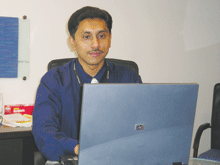With ICT invading all spheres of human activity, there’s a premium on computer programmers both in the ICT and IT-enabled services industries
The brain behind every virtual reality game, mobile phone, database system, is a programmer who writes the software and creates tools for computer usage and information storage. In short, computer programmers are responsible for designing, writing and testing the thousands of lines of codes that make computers work.
With ICT (information communication technologies), and its bewildering possibilities in all spheres of human activity, there’s a premium on computer programmers both in the ICT and IT-enabled services industries. The impact of the internet on businesses and individuals has made computer programming a highly sought career, especially for science and maths students.
Various ‘languages’ have been developed to communicate with computers. Programmers activate computers and computer chip aided devices with the help of programming languages. Computer programmers write, test and maintain software known as ‘programs’, which computers must follow to perform their functions. Programmers also conceive, design and test algorithms to enable problem solving by computers. The time taken to write a program ranges from a few hours for a basic program to a number of years for more complex ones. Hence most programmers work in teams or groups.
Computer programmers are generally divided into the broad categories of applications and systems programmers. Applications programmers write software, manage particular tasks such as inventory tracking, while systems programmers write software to drive computer operating and database mana-gement systems. Systems programmers install, upgrade and maintain all ICT hardware to enable users to derive the full benefits of these wonder machines.
Successful programmers tend to be graduates who sign up with computer training institutes such as NIIT, Aptech, CDAC, which have branches across the country; the Maharashtra-based Jet King; Pune Institute of Computer Technology; Sun Microsystems and SAP. These institutes offer programming courses of six months to three years duration, teaching around 15-20 languages. Tuition fees range from Rs.15,000-150,000 depending on the course duration. However engineering, B.Tech (software) or MCA graduates don’t need these courses as they are already qualified in programming, and are indeed preferred by employers.
Programming professionals also advise aspiring programmers to specialise in a language most suitable to their field of specialisation — database, communication, networking, telecommunication, graphics etc. This is best done in consultation with academic education counsellors. It is, however, essential to learn core programming languages such as C, C++, Java and Dot Net, before moving on to specialised languages. Start-up pay packages range from Rs.10,000-15,000 per month, and for those who upgrade their skills, the career trajectory is fast and lucrative.
 “Although job opportunities for programmers in the IT industry are on the decline, a new world of opportunities has opened up for them in IT-enabled services. The demand for programmers will continue to grow, as evolving technologies require companies to adapt to new languages and computer systems,” says Dulal Ghosh, senior manager (IT) of Centrum Direct Ltd, one of the four subsidiaries of Centrum Capital Ltd, a one-stop shop for all financial services, ranked among the top ten merchant banking firms for transactions in 2003-04 (CMIE-ET), and a SEBI registered category I merchant banker listed on the Bombay Stock Exchange.
“Although job opportunities for programmers in the IT industry are on the decline, a new world of opportunities has opened up for them in IT-enabled services. The demand for programmers will continue to grow, as evolving technologies require companies to adapt to new languages and computer systems,” says Dulal Ghosh, senior manager (IT) of Centrum Direct Ltd, one of the four subsidiaries of Centrum Capital Ltd, a one-stop shop for all financial services, ranked among the top ten merchant banking firms for transactions in 2003-04 (CMIE-ET), and a SEBI registered category I merchant banker listed on the Bombay Stock Exchange.
Ghosh advises aspirants not to be guided by the fact that only entry-level people are titled programmers. “Some of us are proud to call ourselves programmers and will continue to do so. There’s a joy in programming unmatched by other profess-ions. But to be successful, you must have passion for IT, be hard-working, determined, logical and patient.”
A chemistry graduate of Mumbai’s Vivekananda College, in 1991 Ghosh signed up for an 18-month honours diploma in programming at NIIT. In 1993 he began his career as a programmer in the Tata Power Company, Mumbai. Several job changes later, in April 2000, he came aboard Centrum Direct, where among other things he evaluates, recommends and finalises IT solutions for all the business divisions of the organisation; heads a team of software developers to complete integration of software procured from third parties; and supervises the back-office operations of the retail business.
An evangelist for the internet and the worldwide web, Ghosh believes that with technology evolving so fast, programming is a heady and challenging career, especially for those who specialise in data-based programs, e-commerce, animation and graphics.
Quite clearly despite the prevailing economic gloom, the outlook for computer programmers continues to be sunny.
Indra Gidwani (Mumbai)